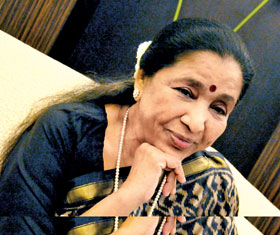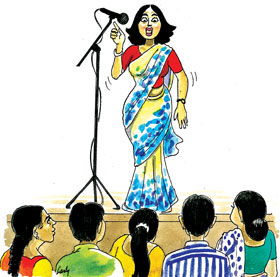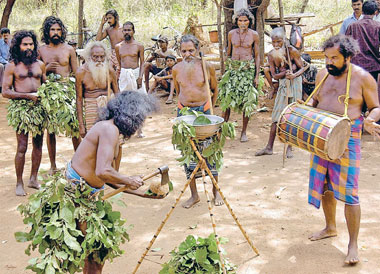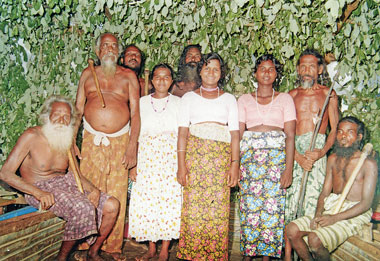|

The success song of the Nightingale
Samangie WETTIMUNY
While she throws tender glances at me, and smiles with motherly
warmth I repeatedly find myself wondering “Is this going to be merely an
interview or an intimate, soul searching chat with a close relative I
have known a good half of my life?” I wonder what to ask next when the
gentle soft-spoken Nightingale ‘dismisses’ mischievously my ‘query’ on
Indian women with an impish smile, but adds; “they are nice, modern,
hard working like you!” Not quite pleased with her response that she
would have been a cook had she not been a female vocalist I pause a
moment... “How challenging was it for you to play double roles as a
mother and a female vocalist in the extremely competitive Indian Film
Industry?” I ask her my ‘most awaited’ question to which she ‘snaps
back’; “I love challenges!”
 |
|
Legendary Female Vocalist Asha Bhosle.
Picture by Saman Sri Wedage |
Here she is! Asha Bhosle, whose melodious voice has enchanted all
Bollywood movie fans for over six decades no matter whether she sang for
the heroine or the ‘bad girl’, the first Indian singer to be nominated
for the Grammy award, a down-to-earth woman as simple as her short and
accurate answers, an epitome of Indian womanhood, more than all a woman
with an optimistic view of life who accepts challenges with open arms,
the exact image of ‘feminine grace’ to grace the Daily News Gender
Forum!
“You have to sing every song well. Just resting on your laurels won’t
help if you wish to survive in the extremely competitive Indian Film
industry” says Bhosle who started her singing career as far back as
1943. “Unlike today when everything has gone digital with dubbing and
modern recording facilities, back in the past extensive practising was a
must to retain your name in the movie world. This is what has helped me
to be in the industry for more than 60 years”
It was no easy task for her to play double roles as a mother and a
play back singer where she had to balance her time between spending time
at home and at the recording room. “I do still remember how I rushed
back home from the recording room to see how the children were doing.
When my house-hold chores were finished I went back to my job.”
She never let any of these obstacles slow down her achievements as
she considered challenges as a part of her life.
Bhosle thrives as the most recorded artiste in the world who has over
12,000 songs to her credit and play back singing for more than 1000
movies.
Despite having undergone difficult family situations as a young wife,
her view of life is extremely optimistic. Today at the age of seventy
seven she calls herself a contented grandmother. “However playing the
grandmother’s role is not as difficult as playing the mother’s role.
Less challenges.” She winks.
Bhosle who recently made her acting debut with Maaee directed by
Mahesh Kodiayal says she got strongly attached to the script “as a
mother and a human being” though it does not resemble her life story
even remotely. Maaee shows what happens when a woman is abandoned by her
only son and then goes to live with her daughter and son-in-law. In it I
play the role of the 65 year old grand mother.”
What more tips for growing old gracefully when Bhosle confidently
reveals the secret. “Extreme self pride or ego makes you think no end of
yourself. You should be down-to-earth and then achieving success is not
very difficult. You feel you are young”. Though many have attributed her
eternally bubbly personality to her celebrity status she is certain that
simplicity is the key tune in her success song..
The Nightingale who was honoured with the Dadasaheb Phalke Award in
2000 and the Padma Vibhushan in 2008 by the Indian government sees no
difference between modern Indian women and their Sri Lankan counterparts
. “They are very modern and maintain a fine balance between their office
work and house-hold chores.”
She herself is unaware what her next ‘hit’ would be, though this
could perhaps be her autobiography which she is currently working on.
“The truth is very bitter. I need time to write my story.”
It will tell the world how she became the woman she is in her own
words amidst a great deal of hardships in her personal life and will set
a guide to millions of women who are struggling to achieve success in
life. What a treat to look forward to!
[email protected]
Women in politics: a male point of view
Lionel WIJESIRI
“When women are fully involved, the benefits can be seen immediately:
families are healthier; they are better fed; their income, savings, and
re-investments go up. And what is true of families is true of
communities, and eventually, the world.”
- Kofi Annan, 7th Secretary General of the United Nations
 Sri Lanka’s women population makes up half the voters but just 6 per
cent of the parliamentary politicians! As a male I do agree it is not a
fair deal. There is a legitimate reason for our women to complain that
their political representation rights and needs are ignored by the male
sector of the country. Sri Lanka’s women population makes up half the voters but just 6 per
cent of the parliamentary politicians! As a male I do agree it is not a
fair deal. There is a legitimate reason for our women to complain that
their political representation rights and needs are ignored by the male
sector of the country.
That women will play a critical role in politics is no longer a
matter of controversial discussion. We saw how struggles and movements
over many decades have marked women’s political empowerment as a high
priority. These took place mainly because it became evident that unless
women have the right and power to contribute in policy making and to
legislate for themselves, they will have to wait for males to do it for
them.
Let us take a look at what other countries have achieved in women’s
right to political accommodation. Country wise, Nordic countries have
42% and Americas 22%, Europe 19.4%, Africa 18.6%, Asia 18.3%, Pacific
15.2%, Arab States 9.1%.
If we go by detail to South Asia, Nepal leads with 33.2% followed by
Pakistan 22.5, Bangladesh 18.6%, India 10.7%, Bhutan 8.5%, Maldives
6.5%, and Sri Lanka 5.8%.
Reasons
Why did Sri Lanka fail? I can see two reasons. First, our political
sphere remains under the dominance of few women linked to power through
family, business, finance or social position leaving out many of those
who are genuinely politically committed.
Therefore, the role these women tend to play is characteristically
defined by the motivation for preservation and protection of their
family, party, financial or class interests. Second, since their power
base is not sown in popular support, they suffer from a sense of
insecurity, which works as a hindrance to their ability to deliver in
the face of serious challenges posed by the society.
Obstacles
There are few common factors which form obstacles to Sri Lankan
women’s active participation in politics. Fortunately for us, unlike in
some Asian countries, we do not have any social discrimination against
women’s roles in the public domain. It is not a factor acting as an
obstacle. The Constitution of Sri Lanka prohibits any discrimination on
grounds of gender and grants women the same legal status as men. Other
than in the political field there is relatively very little social
discrimination against women; many of them own and operate their own
businesses, or occupy senior positions in Government sector and
corporate organizations.
However, I observe a number of other reasons for their
under-representation in political arena. Among them, we find: (1) time
constraints due to career and domestic demands, (2) cultural and
religious arguments that a woman’s place is in the home, (3) constraints
within each political party that do not encourage women to advance
beyond a certain level, (4) lack of adequate resources in terms of
organizational support, personal influence and finance.
Strategies
Are there any strategies that may be used to overcome these
obstacles? Over the past two decades, we can see the continuing role
played by women in sustaining the endeavours for a more open, just, and
equitable society. The vigour with which they are carrying out these
efforts disproves the often quoted cliché that women are fickle and
easily swayed. In as much as there had been enhanced awareness and
discussions of issues of women participation in politics, the political
landscape still does not seem to be moving in the direction where
concrete actions were being put in place to guarantee that “critical
mass” in the political space.
We therefore need to commit to looking at our governance system and
how it can be transformed to benefit both women and men on an equitable
basis.
Four points come into my mind. (1) The Government must have policies
and strategic plans to promote women’s role in politics, including
specific measures in nurturing and employing female cadres, even
determining targets to increase the percentage of women in politics. (2)
Promoting educational activities to help women at all levels to be aware
of the importance of political participation and benefit when they
participate in socio-political process. (3) Women should be made aware
of gender and how to continuously enhance their knowledge and skills,
wisely utilize support and help from everyone. (4) Government must
promote activities in regional and international women’s networks to
exchange information, share experiences and create joint action.
Women’s political, social and economic rights are an integral and
inseparable part of their human rights. Democracy is an inclusive
process, and therefore in a functioning democracy, the points of view of
different interest groups, including women in all social strata, must be
taken into account in formulating any decision.
Lessons from the Children of Nature
Aditha Dissanayake
For Centuries many British and European scholars have seen the Veddas
or the Wanniya-laeto (Forest Dwellers as they call themselves) as the
Wild Men of Ceylon. Yet, had the white men looked beyond the “wildness”
of the Veddas they would have undoubtedly learned many a lesson from
these children of nature. Especially on the subject of looking after
women.
It was Robert Knox who first called the Veddas the Wild Men. “The
Land of Bintan is all covered with mighty Woods, filled with abundance
of Deer.” He wrote in his book An Historical Relation of the Island of
Ceylon “In this Land are many of these wild men: they call themselves
Veddas, dwelling near no other Inhabitants. They speak the Chingulayes
[Sinhala’s] Language.... They never till the ground for Corn, their Food
being only Flesh.”
 |
 |
“As H. Nevill
writes in the Taprobanian," as a rule among the purer
Veddas, the younger women are rigorously excluded or rather
protected from contact with strangers.“
|
Yet, Professor Gananath Obeyesekere says in his essay, Colonial
Histories and Vädda Primitivism that this picture Knox creates of the
Vedda with his bow and arrow and dagger, smoking a huge pipe and wearing
a thick loin cloth is entirely the result of a fertile imagination. “I
suggest that Knox invented this portrait of the wild man because that is
something his late 17th century English public expected to hear” says
Prof. Obeysekere and adds that “perhaps as a result of early
pseudo-scientific studies the Veddas achieved a kind of popular
notoriety.
Many Europeans wanted to see the Vedda as a specimen of the wild man,
or a copy of the primitive Australian aborigine, from the comfort of the
Government Rest (Guest) House, for it was widely believed, on the
flimsiest evidence, that the Veddas were culturally, genetically and
physiologically related to the Australian aborigines.” He quotes from
the classic work on the Veddas written by the Seligmanns (C.G Seligmann
and Brenda Z Seligmann).
“The Veddas have long been regarded as a curiosity in Ceylon and
excite almost as much interest as the ruined cities, hence Europeans go
to the nearest Rest House on the main road and have the Danigala Veddas
brought to them... The white man appeared to be immensely anxious to see
a true Vedda, a wild man of the woods, clad only in a scanty loin cloth,
carrying his bow and arrows on which he depended for his subsistence,
simple and untrained, indeed, little removed from the very animals he
hunted.”
This perception of the Veddas held by the white men is far from the
truth. The Veddas have proven how advanced they are than the “civilized”
people in every sphere of their lives. According to an early 17th
Century manuscript which gives an account of a civil war in Matale
carried out by a nephew of a Vedda chief called Liyana Vedda there were
several insurgent leaders who took part in the rebellion among whom one
of the Chiefs was a woman. Moreover the Seligmann’s state in their book
on the Veddas, “In every respect the women seem to be treated as the
equals of the men, they eat the same food; indeed, when we gave presents
of food the men seemed usually to give the women and children their
share first, the same applies to Areca nut and other chewing stuff.”
Ever concerned about sharing all the good things in life with their
wives the men had insisted the Selligmanns step into the dense jungle to
watch their dances “so that the women might be present and partake of
the food”, which would not have been possible if the performances were
conducted near the writers’ camp.
So too their eagerness to protect their women folk. As H. Nevill
writes in the Taprobanian, “as a rule among the purer Veddas, the
younger women are rigorously excluded or rather protected from contact
with strangers.” On the rare occasion he is allowed a glimpse of the
Vedda women he notes “I never saw women at all comparable to these, and
then only did I realize the (truth behind the) stories I had heard from
the Sinhalese, of the former great beauty of the Vedda women.
(They) had the most exquisite figures, like statues of Psyche, and a
clear brown skin.” Here comes the bottom line. Even though the women
were jealously guarded by the men who did not allow traders or other
strangers to see them they yet allowed the women to occupy “an honorable
and free position in the society of their relations”.
This behaviour of the Wanniya-laeto is surely worth emulating.
[email protected]
|





